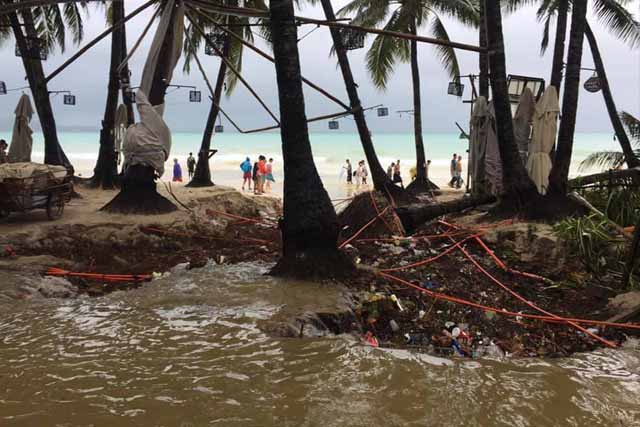Commentary: Challenges in the Philippines' quest for climate justice

The island, dubbed by international travel magazine, Condé Nast Traveler, as Best Island in the World of 2016 and 2017, became an unrecognizable island as "Urduja" flooded the area. Facebook/Christine San Diego
Climate change has never been a top concern for Filipinos, but tragic experiences, like the one brought about by Tropical Storm Urduja, serve as bitter wake up calls for us to address the phenomenon.
“Urduja” was reported to have left more than 30 dead and several more missing, mostly in the Province of Biliran, after making landfall in the country. Worse, we have seen how victims of these weather events suffer endlessly with the snail-paced rehabilitation efforts by our government, as shown by the Yolanda tragedy where the people affected are either given substandard homes or are still living in subhuman conditions four years after the infamous typhoon struck and despite the downpour of financial assistance.
Philippine carbon emissions to guide policy-direction
The paper entitled: “Blameless in Stratosphere: Carbon Footprint, Manufacturing Growth, and the Fuel Mix Debate in the Philippines,” presented in a Stratbase-ADR Institute roundtable discussion, is able to put in context the Philippines’ contribution to climate change. Essentially, it highlighted that the Philippines has a very small carbon footprint with per capita carbon dioxide (CO2) emissions lower than African countries such as Angola, Congo and Djibouti. Notably, Dr. Raul Fabella, et al. looked at other Asian countries in their respective years of comparable development to 2011 Philippines.
Interestingly, the country’s 0.9 metric tons per capita CO2 emissions was significantly lower than 1968 Singapore (2.7 metric tons), 1982 South Korea (3.6 metric tons) and 2004 China (4.1 metric tons). In this comparison, the Philippines, at 2011 development level, was closest to 1991 Thailand and 2008 Indonesia, both at 1.8 metric tons of per capita CO2 emissions. With such a small carbon footprint, the Philippines is said to have remarkably outweighed its CO2 emissions share by its renewables share from 1990-2014.
Surprisingly, such renewables share is observed to even surpass almost all of the top ten carbon emitting countries in the same period. More importantly, it was noted that the transportation sector accounts for the largest average of CO2 emissions in the Philippines at 36.43 percent, followed by “other industries” at 20.22 percent in the same period of 1990 to 2014.
With this backdrop, our policy-makers should focus the climate change mitigation efforts of the country on the transportation system and provide more for our adaptation if we are to effectively respond to the challenges of climate change.
The fact that the traffic situation is still worsening in almost all urban centers of the Philippines should provide urgency as vehicles stuck on the roads for longer periods equates to more burning of fossil fuel, not to mention the dire public health implications. In addition, the handful rail transits we have in this country are not expanding, but in fact deteriorating. So, in order to curb our share of CO2 emissions, our government has to quickly get on its promise of a massive infrastructure program that should introduce modes of transportation that are less dependent on fossil fuel. In this regard, mass transportation should be the priority.
On the climate change resiliency front, one cannot dismiss the value of adapting to extreme weather for such a vulnerable country like the Philippines. The availability of funds from national and international sources to build resilient communities will be a tremendous step towards facing the so-called “new normal.”
A significant action and immediately doable is to promote adaptation and effective dissemination of climate-related data or any risk data. The government can vastly improve our disaster risk management by enabling all concerned to readily and freely access data and information that can heighten the awareness of vulnerable communities and develop their preparedness in responding to natural calamities.
Developed nations role and the quest for climate justice
In the international arena, French President Emmanuel Macron hosted a climate summit, two years after the historic COP 21 Climate Change Agreement in Paris. Said gathering was called the “One Planet Summit,” where emphasis was placed on climate finance or how to ensure the availability of the reported more than US$ 200 billion annual funding in compliance with the provisions of the Paris Agreement.
The call of the French leader was for everyone to act with haste in keeping the global temperature down. Consequently, several commitments were made during the meeting, thereby providing renewed optimism to make the Climate Pact work.
Unfortunately, the government of the United States, under President Donald Trump, was sorely missing in the summit considering their huge contribution to greenhouse gas (GHG) emissions, and great capacity (and responsibility) to chip in into the climate fund.
Without question, the industrialized countries should carry more weight in addressing climate change. Calling the summit “One Planet” is apt and should provide a realization that all of us, regardless of economic standing, will ultimately be adversely affected by the changing climate. Thus, the onus is for the “big boys” to lead the fight by looking inward first, as well as providing assistance to developing nations, most especially the vulnerable ones, to build resiliency.
For the Philippines, such a gathering must again highlight the call for climate justice being a nation ranked among the most vulnerable to extreme weather, yet not a major source of GHG emissions. Definitely, funding mechanisms, utilized properly, greatly aid in establishing resilience in the country.
Although entitlement to such funds cannot be mistaken, the Philippines’ pursuit of climate justice will have another dimension if the effects of the changing climate is linked to human rights. To this end, every nation is obligated to address human rights violations, including those brought about by extreme weather held to be anthropogenic.
Lawyer Lysander Castillo is an environment fellow at the Stratbase-ADR Institute and the secretary-general of Philippine Business for Environmental Stewardship, or PBEST.
- Latest


























